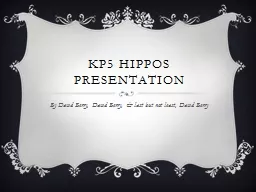PPT-Nuno Lopes Joint work with David Menendez, Santosh Nagarakatte, John Regehr,
Author : danika-pritchard | Published Date : 2018-09-21
Sarah Winkler Improving Reliability of Compilers Compilers Frontend Optimization 1 Optimization n Backend 100101010 010001011 100110101 101010111 001010110 Why
Presentation Embed Code
Download Presentation
Download Presentation The PPT/PDF document "Nuno Lopes Joint work with David Menende..." is the property of its rightful owner. Permission is granted to download and print the materials on this website for personal, non-commercial use only, and to display it on your personal computer provided you do not modify the materials and that you retain all copyright notices contained in the materials. By downloading content from our website, you accept the terms of this agreement.
Nuno Lopes Joint work with David Menendez, Santosh Nagarakatte, John Regehr,: Transcript
Download Rules Of Document
"Nuno Lopes Joint work with David Menendez, Santosh Nagarakatte, John Regehr,"The content belongs to its owner. You may download and print it for personal use, without modification, and keep all copyright notices. By downloading, you agree to these terms.
Related Documents














